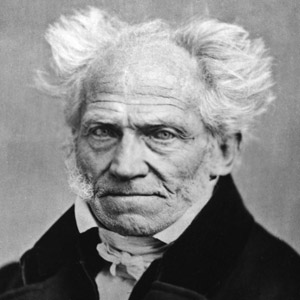
Arthur Schopenhauer (1788 – 1860) was a German philosopher who was born in the city of Danzig. He is best known for his 1818 work The World as Will and Representation, which he expanded in 1844. He was often referred to as “the philosopher of pessimism,” although the focus of his work was on finding a way to find to overcome the fundamentally painful human condition. Schopenhauer was among the first thinkers in Western philosophy to share and affirm significant tenets of Eastern philosophy, having initially arrived at similar conclusions as the result of his own philosophical work. His writing on aesthetics, morality, and psychology have influenced thinkers and artists throughout the 19th and 20th centuries.

Quotes by Arthur Schopenhauer…
To affect a quality, and to plume yourself upon it, is just to confess that you do not have it. Whether it is courage, or learning, or intellect, or wit, or success with women, or riches, or social position, or whatever else it may be that a man boasts of, you may conclude by his boasting about it that this is precisely the direction in which he is rather weak, for if a man really possesses any faculty to the full, it will not occur to him to make a great show of affecting it; he is quite content to know that he has it.
This pulling out of the imagination which I am recommending, will also forbid us to summon up the memory of past misfortune, to paint a dark picture of the injustice or harm that has been done us, the losses we have sustained, the insults, slights and annoyances to which we have been exposed, for to do that is to arouse fresh life into all those hateful passions long laid asleep — the anger and resentment which disturb and pollute our nature.
Courage comes next to prudence as a quality of mind very essential to happiness… Our motto should be “No Surrender,” and far from yielding to the ills of life, let us take fresh courage from misfortune… Let our attitude be such that we would not quake even if the world fell in ruins about us.
It is most important for anyone who is capable of higher and nobler thoughts to keep his mind from being so completely engrossed with private affairs and ungracious troubles as to let them take up all his attention and crowd out worthier matters, for that is, in a very real sense, to lose sight of the true end of life.
The chief result gained by experience is clearness of view. This is what distinguishes the man of mature age… it is only then that he sees things plainly, and takes them for what they really are, while in earlier years he saw a phantom-world, put together with the whims and imaginations of his own mind… the real world was hidden from him, or the vision of it distorted. The first thing that experience does is to free us from the phantoms of the mind.
A man of intellect is like an artist who gives a concert without help from anyone else, playing on a single instrument — perhaps a piano, which is a small orchestra in itself. Such a man is a small world in himself, and the effects produced by various instruments together, he produces all by himself, in the unity of his own consciousness.
No man can see over his own height. Let me explain what I mean. You cannot see in another man any more than you have in yourself. Your own level strictly determines the extent to which he comes within your understanding. If your intelligence is unawakened, mental qualities in another, even though they be of the highest kind, will have no effect on you at all… his higher mental qualities will no more exist for you than colors exist for those who cannot see.
Great minds are like eagles, and build their nests in some lofty solitude.
It is very necessary that a man should be appraised early in life that it is a masquerade in which he finds himself, for otherwise, there are many things which he will fail to understand.
Your friends will tell you that they are sincere; your enemies are really so. Let your enemies’ criticism be like a bitter medicine, to be used as a means of self-knowledge.
